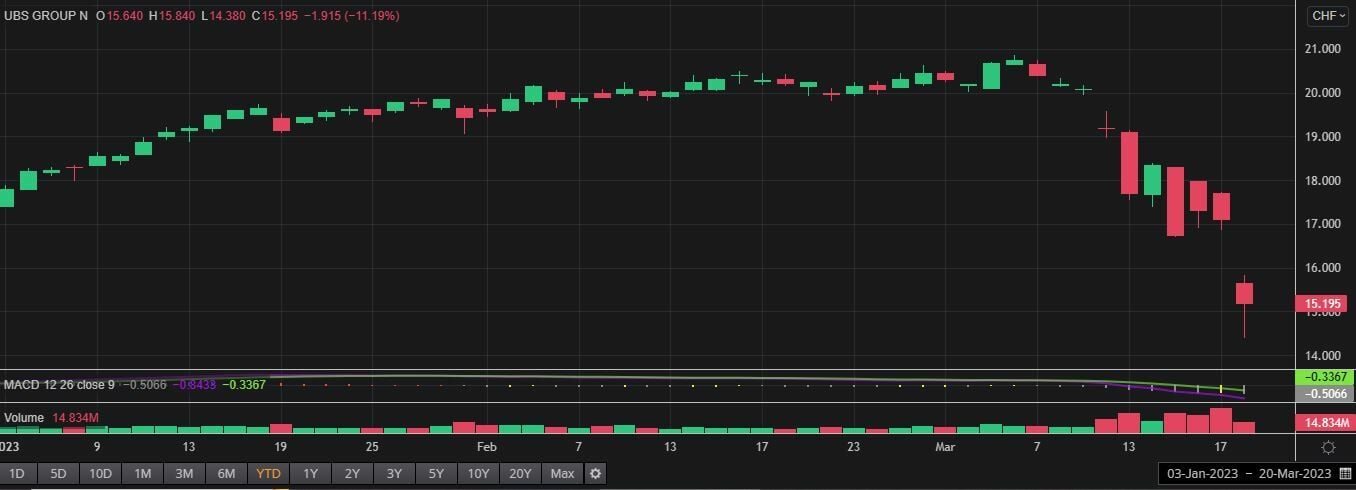UBS is yielding more than 12% this Monday after agreeing yesterday to buy Credit Suisse after upping its bid to $2,000 million at the expense of what authorities say next Monday, the Financial Times reported .

Switzerland’s main bank submitted an initial offer of $1,000 million, which was rejected as too low and damaging to shareholders, Bloomberg reports. The acquisition of UBS brings with it several complexities. The financial company is asking the government to adopt certain legal changes and possible future losses. For example, Swiss regulations require a six-week period to consult shareholders about an acquisitionTherefore, legislative changes are being considered to avoid this delay and facilitate the merger of the two main Swiss banks.
This shareholder veto has drawn fierce backlash from some owners of UBS and Credit Suisse, who have criticized the decision. Vincent Kaufmann, executive director of the Ethos Foundation, which has a presence at both banks, was adamant about this display of poor corporate governance: “I can’t believe that our UBS members and shareholders are happy about this,” he said. «I have never seen such measures; They show how bad the situation is.”
Credit Suisse has been in crisis for several months due to repeated scandals, and the situation has worsened in the last week, which has seen it lose a quarter of its market value. So the Swiss National Bank came to the rescue and provided up to CHF 50 billion in cash. While Credit Suisse avoided a bailout during the financial crisis, it has been plagued by a series of scandals, leadership changes and legal troubles in recent years. Customers had withdrawn more than $100 billion in assets in the last three months of last year as concerns mounted over their financial health.and exits continued even after it asked shareholders for a CHF 4 billion capital increase.
Credit Suisse has informed its employees that its equity investments are operationally separate from UBS for the time being., but once they merge, some customers could consider transferring stock investments to another bank if the merger raises concerns, according to an internal document. “For the time being, the assets will remain legally separate. Of course, as soon as this changes, you (the customers) can consider transferring part of your assets to another bank if there is a risk of concentration,” says the statement, which the Credit Suisse sent to its employees has been picked up by Reuters. This answer is suggested to Credit Suisse employees when clients ask them what to do if they are also a UBS client and want to do so avoid excessive concentration of assetswhich can be a problem for wealthy customers.
The transaction makes UBS the only global bank in Switzerlandand the Swiss economy will become more dependent on a single bank.” The Credit Suisse debacle will have serious consequences for other Swiss financial institutions when it comes to investing,” said Octavio Marenzi, CEO of Opimas, in Vienna. UBS boss Kelleher said this at a press conference to liquidate the investment bank Credit Suisse, which has thousands of employees around the world. UBS expects annual cost savings of about $7 billion through 2027.
What will happen to Credit Suisse bondholders?
The question now is what will happen to Credit Suisse bondholders. Under the agreement, The Swiss regulator has ruled that Credit Suisse’s $17 billion Additional Tier 1 Notes — or AT1 Notes — will be rated at zerowhich angered some of the creditors who thought they were better protected than shareholders in the takeover deal announced on Sunday. Concerns about what this could mean for holders of AT1 bonds issued by other banks are compounded by ongoing concerns amplified over a variety of other risks, including contagion, the fragile state of US regional banks, and moral hazard.
with the operation, UBS pays CHF 0.50 per share according to the report. Additionally, Bloomberg has reported that the Swiss National Bank has offered $100,000 million in liquidity to handle the operation.